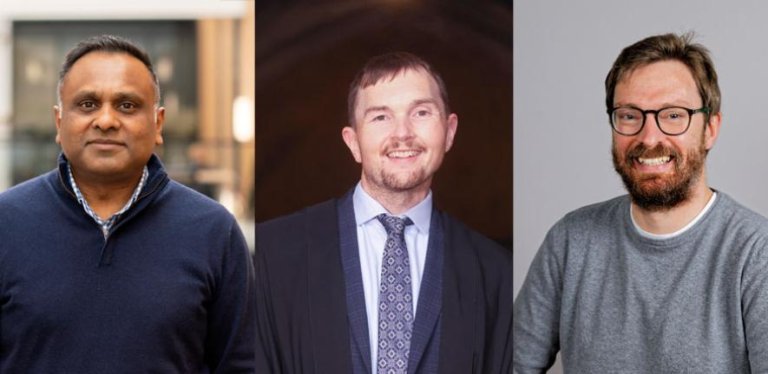Please check the information entered!
- Please check the information entered
A log-in email has been sent to your email address
Forgot password? Reset password

Professors Manish Chhowalla, Nic Lane and Erwin Reisner. Credit: University of Cambridge
Three University of Cambridge researchers have been awarded £10m by the Royal Academy of Engineering to develop emerging technologies with high potential to deliver economic and social benefits to the UK.
Professors Manish Chhowalla, Nic Lane and Erwin Reisner were awarded the refunds under the Academy’s Chair in Emerging Technologies scheme, which is funded by the UK Department for Science, Innovation and Technology and aims to identify global research visionaries and provide them with long-term support.
Professor Manish Chhowalla FREng, from the Department of Materials Science and Metallurgy, is developing ultra-low-power electronics based on wafer-scale manufacture of atomically thin (or 2D) semiconductors. The atomically thin nature of the 2D semiconductors makes them ideal for energy-efficient electronics. To reap their benefits, complementary metal oxide semiconductor processes will be developed for integration into ultra-low power devices.
Professor Nic Lane and his team at the Department of Computer Science and Technology, are working to make the development of AI more democratic by focusing on AI methods that are less centralised and more collaborative, and offer better privacy protection. Their project, nicknamed DANTE, aims to encourage wider and more active participation across society in the development and adoption of AI techniques.
Professor Erwin Reisner, from the Yusuf Hamied Department of Chemistry, is developing a technology, called solar reforming, that creates sustainable fuels and chemicals from biomass and plastic waste. This solar-powered technology uses only waste, water and air as ingredients, and the sun powers a catalyst to produce green hydrogen fuel and platform chemicals to decarbonise the transport and chemical sectors. A recent review in Nature Reviews Chemistry gives an overview of plans for the technology.
Dr Andrew Clark, Executive Director, Programmes, at the Royal Academy of Engineering, said: “I am excited to announce this latest round of Chairs in Emerging Technology. The mid-term reviews of the previous rounds of Chairs are providing encouraging evidence that long-term funding of this nature helps to bring the groundbreaking and influential ideas of visionary engineers to fruition. I look forward to seeing the impacts of these four exceptionally talented individuals. We do not anticipate running a further call for Chairs in Emerging Technologies in the next financial year but we look forward to the upcoming launch of our Green Future Fellowships and sharing plans for other long-term funding opportunities.”
Since 2017, the Chair in Emerging Technologies programme has awarded over £100m to Chairs in 16 universities located across the UK.
Looking for your next technology, science or engineering role? Maybe you’re just starting out in your career? Polytec is here to help you find the perfect position for you. Browse our current vacancies now >>> www.polytec.co.uk/jobs